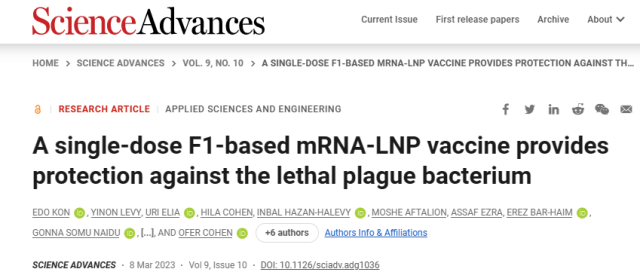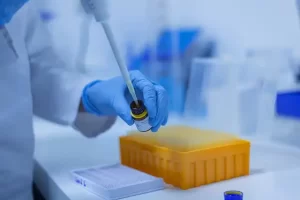World first: An mRNA vaccine that can 100% protect against deadly bacterial infections is available
- Early Biomarker for Multiple Sclerosis Development Identified Years in Advance
- Aspirin Found Ineffective in Improving Recurrence Risk or Survival Rate of Breast Cancer Patients
- Child Products from Aliexpess and Temu Contain Carcinogens 3026x Over Limit
- Daiichi Sankyo/AstraZeneca’s Enhertu Shows Positive Results in Phase III DESTINY-Breast06 Clinical Trial
- Mn007 Molecules Offer Potential for Combating Streptococcus pyogenes Infection
- Popular Indian Spices Banned in Hong Kong Over Carcinogen Concerns
World first: An mRNA vaccine that can 100% protect against deadly bacterial infections is available
- AstraZeneca Admits for the First Time that its COVID Vaccine Has Blood Clot Side Effects
- Was COVID virus leaked from the Chinese WIV lab?
- HIV Cure Research: New Study Links Viral DNA Levels to Spontaneous Control
- FDA has mandated a top-level black box warning for all marketed CAR-T therapies
- Can people with high blood pressure eat peanuts?
- What is the difference between dopamine and dobutamine?
- How long can the patient live after heart stent surgery?
World first: An mRNA vaccine that can 100% protect against deadly bacterial infections is available
Messenger RNA (mRNA) lipid nanoparticle (LNP) vaccines have emerged as an effective vaccination strategy nowaday, and although they are currently applicable to viral pathogens, data on the effectiveness of this platform against bacterial pathogens are very limited.
Recently, in a research report titled “A single-dose F1-based mRNA-LNP vaccine provides protection against the lethal plague bacterium” published in the international journal “Science Advances”, researchers from Israel’s Tel Aviv University and other institutions passed Research has developed the first mRNA-based vaccine that may be 100 per cent effective against a bacterium that is deadly to humans.
 https://www.science.org/doi/10.1126/sciadv.adg1036
https://www.science.org/doi/10.1126/sciadv.adg1036
Research Background
Since viruses make proteins in our own cells, the proteins translated from the viral genetic sequence are similar to those translated from mRNA synthesized in the lab; however, bacteria may be an entirely different story and do not require The host’s own cells produce their own proteins, and because humans and bacteria evolved differently, the proteins produced by bacteria are different from those produced by human cells, even if they are based on the same genetic sequence.
For viruses, their reproduction must rely on external host cells. After the virus invades the cell, it will use the host cell as its own synthetic factory to produce proteins and nucleic acids required for replication based on its own genetic material.
Researchers have attempted to synthesize bacterial proteins in human cells, but these bacterial proteins induce low levels of antibodies and a general lack of protective immunity.
This is because, although the proteins translated by the bacteria themselves and those synthesized in the laboratory are the same based on the same genetic information, the proteins translated in human cells undergo significant changes when they are secreted from the cells.
The miracle drug “Metformin”
To address this issue, the researchers developed methods to secrete the bacterial protein while also bypassing the classical secretion pathway, which is the most problematic for this application, resulting in a dramatic immune response , the immune system will treat the protein in the vaccine as an immunogenic bacterial protein.
In order to enhance the stability of the bacterial protein and ensure that it will not be rapidly broken down in the body, the researchers reinforced it with a part of human protein. By combining two breakthroughs With this aggressive strategy, researchers can get a comprehensive immune response.
According to the researchers, there are currently no vaccines for many pathogenic bacteria. In addition, due to the overuse of antibiotics in the past few decades, many bacteria have developed a certain resistance to antibiotics. Human health poses a serious threat, so the development of a new type of vaccine may provide a basis for improving human health.
Significance
In conclusion, the study demonstrates a rapidly and fully protective mRNA-LNP vaccine against the deadly Yersinia pestis.
The current findings suggest that the mRNA-LNP platform can be used to develop effective vaccines against bacterial pathogens.
This study developed an mRNA-LNP vaccine based on the F1 capsular antigen of Yersinia pestis. Through mRNA sequence optimization, GC content design and antigen design, the mRNA vaccine can induce humoral immunity and cellular immunity in mice.
A single dose provides rapid and 100% protection against deadly Yersinia pestis infection.
It is reported that this is the world’s first mRNA vaccine candidate against a deadly human bacterium.
The research team said that this new technology can quickly develop effective vaccines against bacterial infectious diseases.
Considering the emerging crisis of antibiotic resistance worldwide and the lack of effective Conventional therapy and candidate vaccines, this study has great significance and application prospects.
Reference: https://www.science.org/doi/10.1126/sciadv.adg1036
(source:internet, reference only)
Disclaimer of medicaltrend.org
Important Note: The information provided is for informational purposes only and should not be considered as medical advice.



